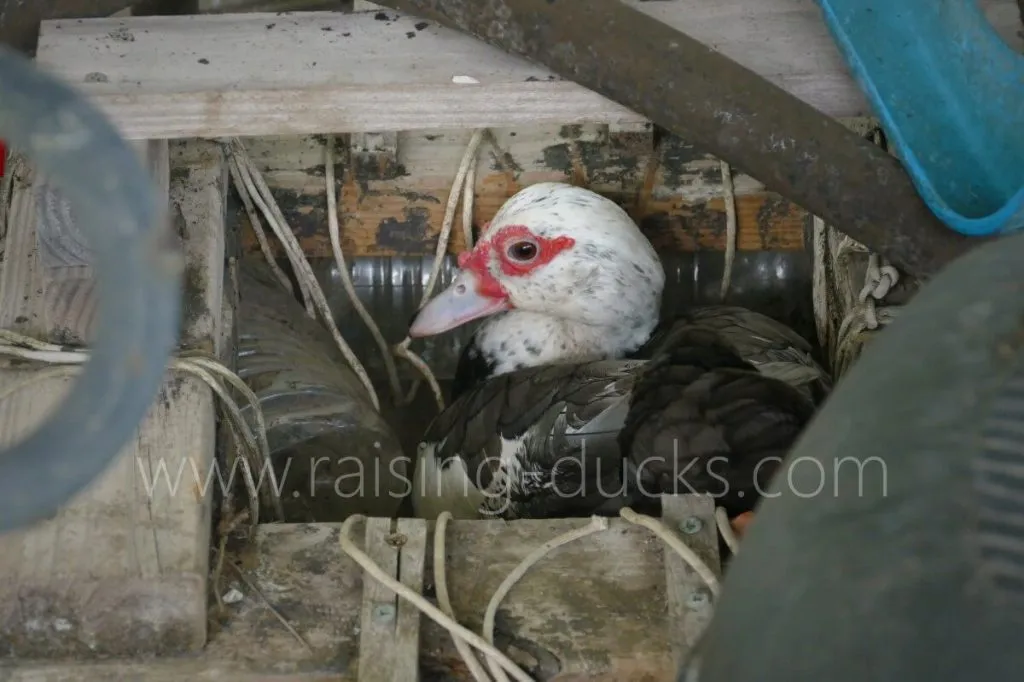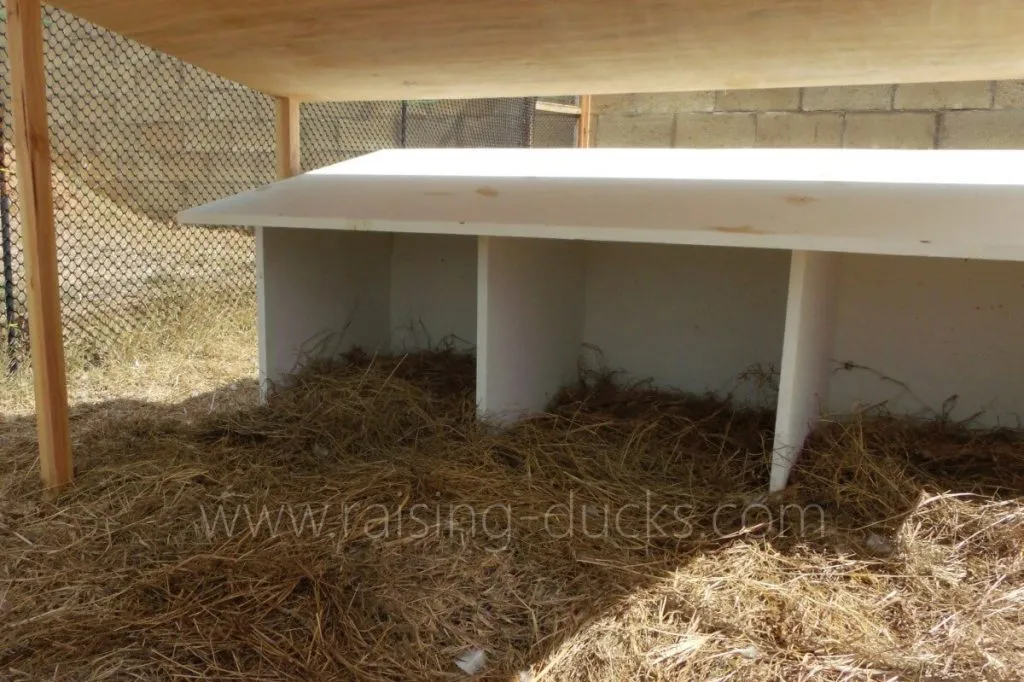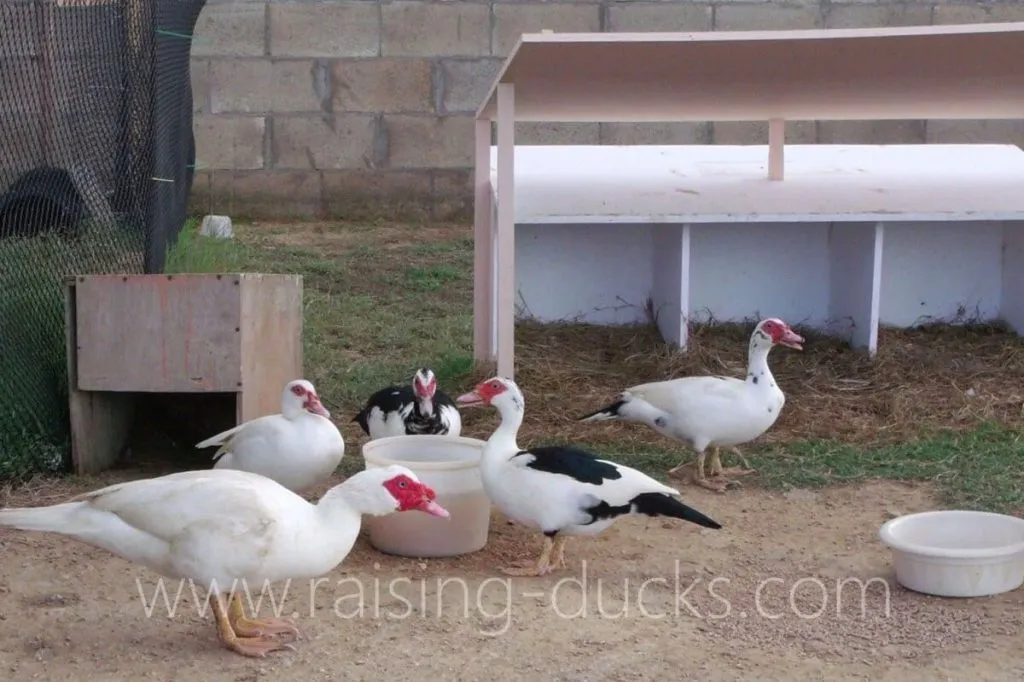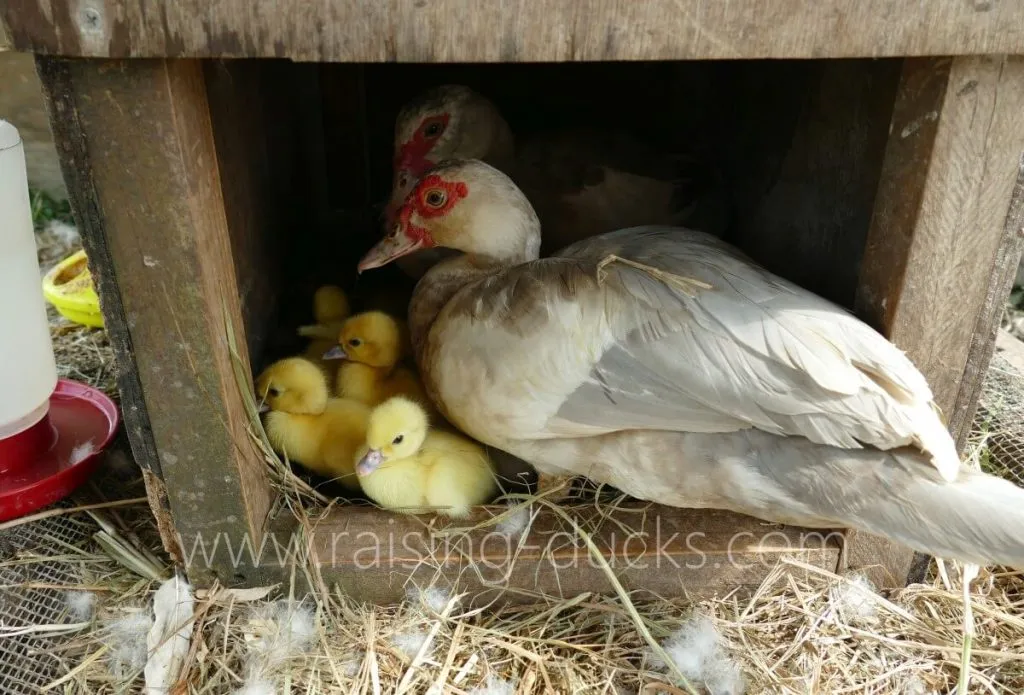The other day, I was wandering around the duck yard, looking for two rascals who were late for bed, when I spotted three lovely white eggs, snug under a wood pile.
Many ducks, particularly those who are often inclined to go broody, are notorious nest hiders. They think hiding their nest is their life’s duty.
Owners of ducks who like to play egg hide-and-seek frequently run into hidden treasure: a nest, sometimes with twenty or more eggs in it.
The only problem?
Sometimes the eggs are so old they’re rotten.
Sometimes foxes or other predators find the nest before the owner does.
Sometimes the nest location is wonderfully chosen…but only to the duck. Duck owners have been known to find nests inside their car (after leaving their windows down), in the neighbor’s yard, in places completely unreachable to us big humans.
One of my Muscovy ducks made a nest and went broody under an old shipping container. We simply couldn’t reach the eggs. Five weeks later, she reappeared, proudly towing four ducklings.

Some nest! This is one of my ducks nesting in a thing (it was an overly complicated flotation device we made for a water pump involving plastic bottles tied to a wooden frame).
And here are more examples, comparing my Muscovy ducks’ nest locations to my Saxony ducks:
So there is one big question facing all owners of the sneaky ducks who like to hide their nests:
How do I discourage my ducks from hiding their nests?
Simply, offer your ducks nest boxes that they will actually want to use.
And there’s one key to an irresistible nest:
Privacy.
When I was younger and had my first flock of Muscovies, my dad made a gorgeous wooden nest condominium with three comfy nests. I filled them so full of dried grass clippings that I couldn’t imagine the ducks turning down such a cozy spot. Surely they’d love it.
Right?
They never laid in it. Not once.
It was such a pity. We even painted the nest boxes all pretty and white.
They thought it was nothing more than something to poop on.

This is the fancy nest that failed miserably. It looks perfect, doesn’t it? Not according to the ducks!
On the other hand, my entire flock of ducks all competed for nesting rights in a tiny, floorless nest made of half-rotten scrap wood.

This is a photo of my first duck flock in front of their nest boxes, the fancy one they hated and the homely, unembellished one they loved. See how dark it is? That’s the answer.
Eventually I figured it out.
The fancy nest faced the feeding area and was completely open. You could see the inside of the nest standing up, or two hundred feet away. The scrap wood nest had a piece of plywood over the front so that the opening was so low that even the ducks had to put their heads down to get in. Even squatting, a human couldn’t see in.
There were two other problems with the fancy nest.
One, the white color didn’t help. It made the interior much brighter and more visible. The scrap wood nest was just the color of wood.
Two, they had removable wire screen floors with hay on top. Some ducks don’t mind artificial floors, but most ducks prefer to lay on dirt, perhaps with a little bit of straw or bedding. The scrap wood nest had no floor. They want to be able to scrape out a depression in the dirt. They don’t like trying to dig into wire or wood.
Many ducks, particularly Muscovies and breeds that like to set, will no sooner deposit their precious eggs in the open than most humans will take a shower naked in the middle of a street.
So if you want your ducks to lay in your nest boxes, they have to be private. Some duck owners hang a piece of cloth over the front as a curtain. The opening shouldn’t be much bigger than the duck.
Some people put fake eggs in their nesting boxes, with the intention of showing the hens that it’s a safe place to lay. Golf balls are often used as fake eggs among chicken owners, but they’re too small and light to fool ducks. I have a set of fake wooden eggs that are the correct size and shape, but slightly too light. Some of my ducks always kick them out of nesting boxes, but others seem to be fooled by them. Ceramic eggs may work better.
Also, try to minimize nesting areas in your ducks’ yard. Mow the grass, remove wood piles, and scout out all possible locations where a duck might choose to make her nest.
If your ducks have been laying outside the coop, you might try locking them in the coop until noon or later in the day for a couple of days to force them to lay there. This might convince them to get back in the habit of laying where you want them to.
Try to let them out of their coop or pen after they have finished laying. Read What Time of Day Do Ducks Lay Eggs? for more.
If you let your ducks out early, or they seem to always lay late, try putting nest boxes in their yard. My ducks often have not laid by the time I let them out of their pen. I have several nest boxes scattered around their yard.
Also, they seem to pay more attention to new nesting areas, so I like to move these boxes around every once in a while. Recently, I moved a box under a cluster of bushes and put a cinder block in front to make it even more private. Immediately, a gang of ducks came to check it out, and it wasn’t long before about five ducks were competing for nesting rights in that box. A few weeks later, no one paid attention to it anymore. So I moved it again. And they laid in it again.

Not only do the ducks like this nest, it was so successful and popular that two ducks went broody in it simultaneously and ended up co-parenting a clutch of adorable ducklings.
But no matter what you do, there will still be the occasional rogue who just doesn’t like anything the humans provide and manages to hold her egg until she’s free from the coop. She wants to make her own hidden, secret nest where nobody will ever find her.
How do I find these hidden nests?
It’s fun when you run across a hidden nest with a treasure trove of eggs. But often, we would rather know about these nests, especially if they happen to be in a bad location.
If your ducks free-range over a large area, it’s especially difficult, because there may be almost no end to the possible nest areas.
But don’t lose hope. There’s one little secret.
They hide their nests well, but they can’t hide themselves when they head to their nest to lay.
When you let your ducks out, keep an eye out for any ducks that make a beeline in an unusual direction—and then follow them.
Leave a comment
Your email address will not be published.